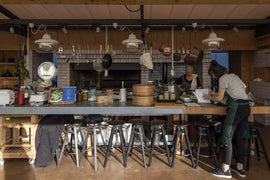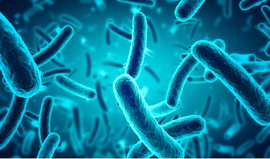There are whole shelves of books, documentaries, tv shows and articles everywhere on gut health, your microbiome, the gut-brain connection, gut health for immune-boosting, anxiety, depression, bad guts, clever guts... Books on what not to eat, how to eat, when to eat, what's bad about fermented foods, or great about them and gut-health specific diets.
When I started talking to some of my keen and health conscious friends about how great our wild and slow fermented kraut was in 2013 they went straight to their naturopath for confirmation. At that time, most practitioners would say that they’d never heard of ferments or might prescribe a probiotic. Then shows like Dr Mosley: Gut and Catalyst’s Gut Revolution started appearing on TV and somehow we were validated. I appreciate the timing of it all. But, to me, it also indicates how far removed we are from simply trusting our common sense and traditional, ancestral foods and lifestyles. Science is great, but common sense in foods; using our senses, listening to our bodies and thinking about where something comes from, how it's made and if it's truly good for us - I think we've survived well enough without exact, clinical trials and scientific studies on what to eat.
I stopped recommending our ferments for gut health when people started asking how much they should ‘take’. I get that stomachs can be out of balance and may take time to become used to a specific food item. It makes me sad, though, that living foods like kimchi and sauerkraut are recommended by doctors to be taken in tiny doses. These are foods that people around the world have been eating forever, and here we are being told to just take a teaspoon of kraut juice and build up slowly before eating it.
In my experience, kind of like exercise, healing a gut is never complete; it’s an ongoing process. Sorry, you don’t just heal something once and go back to your old ways. It’s a constant and changing thing, on ongoing commitment. Our body is pretty much a complex tube—what goes in goes out, including your probiotics and prebiotics. Including sauerkraut and kimchi, kefirs and vinegars, breads and tempeh. Gut healing, in general, isn’t a one-off effort. It’s about realising that we have been missing these foods, and that our current environment doesn’t support wild, living foods. Nor are we very exposed to soil and dirt, and other things we’d have been exposed to only generations ago. So we need to make an educated effort to feed ourselves well. Modern cities, industry and food science have made it harder to get good and real food, but it’s out there.
I would summarise how to eat for your gut like this: eat less, eat fewer simple carbohydrates, eat slowly, chewing well, aim for mostly whole, non-processed foods. Eat more living foods more often. Eat lots of plants. Make an effort for yourself. Don't eat for just weight loss. Eat and prepare food with people.
A word on prebiotics
When you are eating living foods that bacteria chooses to grow on, you don’t need to worry about ‘taking’ a prebiotic. A prebiotic is something that will feed your bacteria should your guts not have anything in it. If you eat your living ferments, bacteria already happily exists on that food. Basically, if you are eating a fibrous, varied diet your gut will have prebiotics in it.
If you don’t have a pre-condition that requires a detailed plan, I recommend having a wide variety of good whole foods, mostly comprised of plants (as Michael Pollan says), and include a ferment as regularly as possible. Start with what you can—buy (or make) some different kinds. Remember, the products that are chilled in the fridge are living things; ones on the shelf have been pasteurised and the bacteria is no longer alive. Respectfully, that’s basically the difference between a ferment and a pickle. Make sure you find the good, living ones.
Some ferments aren't so much full of life, but rather easier to digest. Sourdough, injera and dhosa are good examples, as are tempeh and miso : even though they are cooked and therefore any living bacteria doesn't survive, they are transformed and more delicious, more complex, often more edible, with a gentler texture perhaps, and preserved. These foods are almost always highly nutritious and gentle on your whole system.
There’ll be more wild things living inside if you eat raw, living foods —small amounts, as varied as possible and as regularly as you can. Enjoy their amazing flavours and be gentle on yourself. Keep moving, breathe and, even better, meditate. Don’t worry about being too clean, or waging the war on bacteria. Do be curious - there is a world of ferments out there. Find the ones you like. x
Find similar articles
JournalHi, I saw your beautiful shop on Better Homes & Gardens.
My son, age 9, is on along course of antibiotics post surgeries and one of my family members has coeliac disease.
I would like to know what would be the best way to start incorporating living bacteria into our family’s diet & what are easy for kids to eat? Aka that they’ll actually eat? ☺️
I’m interested I helping my son who suffers from a sensitive gut along with allergies and intolerance. Getting his micobiome to its optimum is my goal. He is 19yrs but I’m still responsible for feeding him
I am thrilled you are an Australian company promoting this ancient tradition that has basically been forgotten. The Scandinavian countries still preserve their foods as they have such a short growing period and have to store it for twelve months to survive. Well done, (my comment does not have to be published)
Wonderful, and thank you all.



Comments